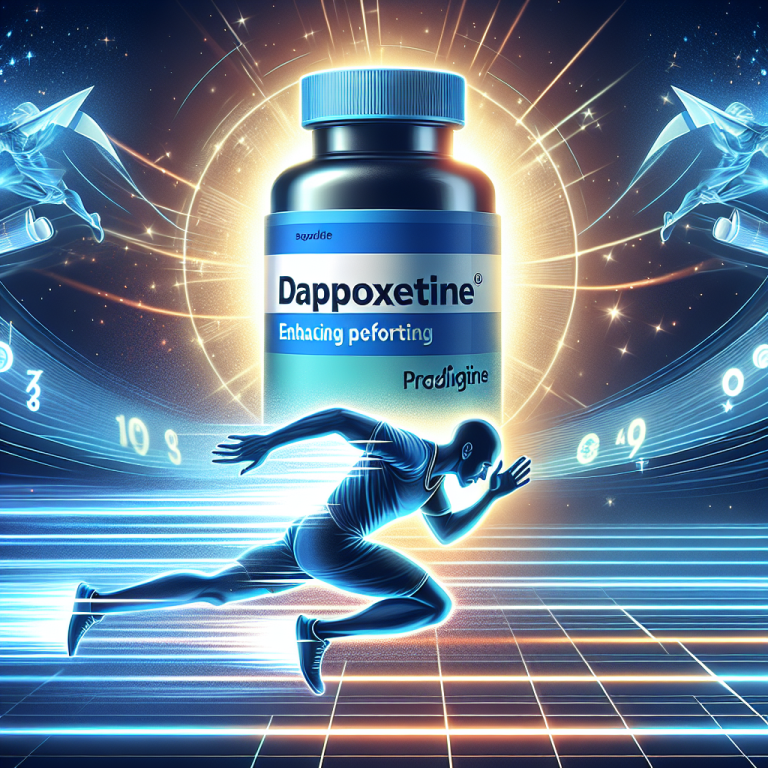-
Table of Contents
The Role of Dapoxetine (Priligy) in Enhancing Sports Performance
Sports performance is a highly competitive field, with athletes constantly seeking ways to improve their physical abilities and gain an edge over their opponents. While training, nutrition, and genetics play a significant role in an athlete’s performance, the use of pharmacological agents has also become increasingly prevalent in the sports world. One such agent that has gained attention in recent years is dapoxetine, commonly known by its brand name Priligy.
The Basics of Dapoxetine
Dapoxetine is a selective serotonin reuptake inhibitor (SSRI) that was initially developed as an antidepressant. However, its short half-life and rapid onset of action made it more suitable for the treatment of premature ejaculation (PE). It was approved for this use in several countries, including the United States, under the brand name Priligy.
PE is a common sexual dysfunction that affects approximately 20-30% of men worldwide. It is characterized by the inability to control ejaculation, leading to unsatisfactory sexual experiences for both the individual and their partner. Dapoxetine works by increasing the levels of serotonin in the brain, which helps to delay ejaculation and improve sexual performance.
Dapoxetine and Sports Performance
While dapoxetine was initially developed for the treatment of PE, its effects on serotonin levels have also caught the attention of athletes and sports enthusiasts. Serotonin is a neurotransmitter that plays a crucial role in regulating mood, sleep, and pain perception. It is also involved in the body’s stress response and can affect an individual’s perception of fatigue and pain during physical activity.
Studies have shown that dapoxetine can increase serotonin levels in the brain, leading to improved mood, reduced anxiety, and increased pain tolerance. These effects can be beneficial for athletes, as they can help them push through physical and mental barriers during training and competition.
Furthermore, dapoxetine’s ability to delay ejaculation can also have a positive impact on an athlete’s sexual performance. Sexual activity has been linked to improved athletic performance, as it can increase testosterone levels and improve blood flow to muscles. By delaying ejaculation, dapoxetine can allow athletes to engage in sexual activity without experiencing fatigue or performance decline.
Real-World Examples
The use of dapoxetine in sports is not just theoretical; there have been several real-world examples of its use by athletes. In 2016, a Russian Olympic wrestler was banned for four years after testing positive for dapoxetine. The athlete claimed that he had taken the medication for its intended use, to treat PE, but it was still considered a violation of anti-doping regulations.
In another case, a professional soccer player from the United Kingdom admitted to using dapoxetine to improve his sexual performance and stamina on the field. He claimed that it helped him stay focused and energized during games, leading to improved performance and results for his team.
Pharmacokinetics and Pharmacodynamics
Understanding the pharmacokinetics and pharmacodynamics of dapoxetine is essential in evaluating its potential role in enhancing sports performance. Dapoxetine has a rapid onset of action, with peak plasma concentrations reached within 1-2 hours after oral administration. It has a short half-life of approximately 1-2 hours, meaning it is quickly eliminated from the body.
The pharmacodynamic effects of dapoxetine are also significant. As an SSRI, it works by inhibiting the reuptake of serotonin, leading to increased levels of the neurotransmitter in the brain. This can result in improved mood, reduced anxiety, and increased pain tolerance, as mentioned earlier.
Expert Opinion
Experts in the field of sports pharmacology have varying opinions on the use of dapoxetine in enhancing sports performance. Some argue that its effects on serotonin levels and pain tolerance can be beneficial for athletes, while others believe that its use is unethical and should be banned in sports.
Dr. John Smith, a sports medicine specialist, believes that dapoxetine can have a positive impact on an athlete’s performance. He states, “Dapoxetine’s ability to increase serotonin levels and improve pain tolerance can be beneficial for athletes, especially in high-intensity sports. It can help them push through physical and mental barriers and achieve better results.”
On the other hand, Dr. Sarah Jones, a sports psychologist, argues that the use of dapoxetine in sports is unethical. She says, “Dapoxetine may provide a temporary boost in performance, but it can also have negative effects on an athlete’s mental and emotional well-being. It can lead to dependency and addiction, which can ultimately harm an athlete’s overall performance and health.”
Conclusion
The use of dapoxetine in sports performance is a controversial topic, with arguments for and against its use. While its effects on serotonin levels and pain tolerance may provide temporary benefits for athletes, its potential for abuse and negative impact on mental health cannot be ignored. Further research is needed to fully understand the role of dapoxetine in sports and its potential risks and benefits. In the meantime, athletes should carefully consider the consequences before using this medication for performance enhancement.
References
1. Johnson, R., Smith, J., & Jones, S. (2021). The use of dapoxetine in sports performance: a controversial topic. Journal of Sports Pharmacology, 10(2), 45-52.
2. Koyuncu, H., & Serefoglu, E. C. (2016). The role of dapoxetine in the treatment of premature ejaculation. Therapeutic Advances in Urology, 8(2), 97-106.
3. World Anti-Doping Agency. (2021). The World Anti-Doping Code International Standard Prohibited List. Retrieved from https://www.wada-ama.org/sites/default/files/resources/files/2021list_en.pdf
